The Loyal Berkshire Lodge of Hope was sponsored by Vitruvian Lodge No. 87 (London), in 1850. The Founding Master was John Packer, who was also the Founding Master of the Royal Sussex Lodge in Newbury in 1815 at the age of 35, and is credited with reviving Freemasonry in Newbury, in the days before the advent of street lighting and railways. At that time Freemasonry required men of standing and intelligence, which considerably limited its intake, and it wasn’t until 1900 that candidates for Freemasonry were from other than the gentry and professional classes.
The Loyal Berkshire Lodge of Hope’s Warrant from Grand Lodge is dated 21st March 1850. It bears the signature of the Earl of Zetland, Grand Master, with its original number 839. This number lasted until 1863, when Grand Lodge carried out a general renumbering to close gaps and it became 574. The original seal is still in the display cabinet at Newbury Masonic Centre along with the oldest surviving minute book dating back to October 1861. The Lodge is one of the oldest in Berkshire being preceded by The Etonian Lodge of St John No. 209 in 1813 and Reading Lodge of Union No. 414 in 1833. The Lodge has had many meeting places, notably the White Heart Tavern, The Three Tuns (now named The Elephant at the Market), the Council Chamber, the Congregational School Room, the Temperance Hall, the Oddfellows Hall, Own Premises off Northbrook Street, and Clarendon Gardens London Road, the present Newbury Masonic Centre.
Early subscriptions were 10s. 6d. per quarter and an Initiation fee of 5 guineas. The Lodge was opened at 7.30pm. Banquets were at the expense of the Lodge, the Tyler was paid 3s. 0d. and given free refreshment after the banquet. Attendances were small, under 10 initially, and improved in 1857 when the Earl of Carnarvon became a joining Member and went on to become Pro Grand Master. Minutes were brief – six lines! However, the Lodge struggled until there were 16 Initiates over the two years of 1869/70. Then the start time was brought forward to 6.00pm, the newspaper "The Freemason" was purchased and a Ball held at the Mansion House, attended by 120, commenced at 9.00pm, with supper at midnight and dancing until 6.00am.
In 1872 Provincial Grand Lodge was held in Newbury and the Province of Berkshire separated from Buckinghamshire in 1890 and began to grow. 1875 saw the first mention of a Past Master’s Jewel being presented and at that time Installation ceremonies were carried out by the Provincial Grand Secretary. In 1878 Charles Hopson became Secretary and in May 1879 the Treasurer was fined 2s. 0d. for non attendance, and in December submitted his resignation! 1882 was marred by the sudden death of the Worshipful Master, Walter B Wilson at the age of 32, during his year of Office. A procession followed the hearse in full Masonic regalia and the grave, which stands in Newtown Road Cemetery, was restored by the Lodge in 2010.
To summarise the first 50 years, by 1900 the Lodge was well established, had its own fully equipped Masonic Temple in premises off Northbrook Street, a Daughter Lodge, a Royal Arch Chapter and ten of its Worshipful Masters were Mayor of Newbury.
From 1902 onwards Brother Camp and Brother Hopson donated carpet, hymn books, a portrait of H M King Edward VII, brass knockers for the temple door and oak platforms for candles. The Lodge building was financed by Debenture Shares and electricity arrived in 1923. In 1913 the ballot for the candidate proved unfavourable, the only time this has happened in the Lodge’s history. 1919 was a remarkable year with as many emergency meetings as regular ones, 14 Brethren were Initiated, there were 11 double ceremonies and one triple. In 1921 there were 89 Brethren present at the Installation. Daughter Lodges then came at regular intervals, Victory Lodge No. 3954 in 1919, Hungerford Lodge No. 4748 in 1925, St Bartholomew Lodge No. 6307 in 1947, and Thatcham Lodge No. 8121 in 1966.
The Centenary Celebration was held at the Corn Exchange in October 1950. There are 96 names listed in the attendance register and the banquet was held at the Chequers Hotel. From 1951 white gloves were worn at all ceremonies following a communication from Grand Lodge and in 1954 a Masonic Church Service was held at Chilton Foliat Church, the Parish Church of the Chaplain of the Lodge, Reverend Unwin. In 1958 the Benevolent Fund was formerly constituted as a Charity and in 1961 the Lodge moved to its current premises. The foundation stone was laid by Right Worshipful Brother Lt Col R H Ingham Clark the Provincial Grand Master (PGM). The subscription was raised to 4 guineas. On 1st June 1971 the Worshipful Masters of all our daughter Lodges were present and all occupied Chairs. In 1975 the Lodge celebrated its 125th Anniversary, the principal guest being Very Worshipful Brother J E Bignal the Deputy Provincial Grand Master (DPGM). In 1976 the PGM and his team dedicated a new Lodge Banner and in 1977 the Secretary Worshipful Brother Hague celebrated 25 years in the role, coinciding with the Queen’s Silver Jubilee.
During the decades of the 80s, 90s and 00s the Lodge membership fluctuated but overall has continued to increase in numbers.
On 2nd December 2014 Worshipful Brother William 'Bill' Coster, a Past Master of Hope Lodge and Past Provincial Junior Grand Warden (PPJGW), was granted Honorary Membership after celebrating 50 years of Freemasonry. He was later presented by the PGM with a 50 year certificate in recognition of his length of service. By 2015 the Lodge Banner was almost 40 years old and on 3rd March 2015 a newly designed banner was dedicated by the PGM, Right Worshipful Brother M G Peters, assisted by 6 other Provincial Officers. The ceremony was conducted at the Newbury Masonic Centre at the 1,317th Regular Meeting of Hope Lodge.
In April of 2019 the Lodge held its 1,350th Regular Meeting and was honoured by the presence of Right Worshipful Brother Anthony Howlett-Bolton OBE, the Provincial Grand Master for Berkshire.
There have been many dedicated Freemasons in the history of the Loyal Berkshire Lodge of Hope, we are proud to follow in their footsteps and you too could become part of this history.
(Unless otherwise indicated, all research conducted by W Bro Brian Sylvester)
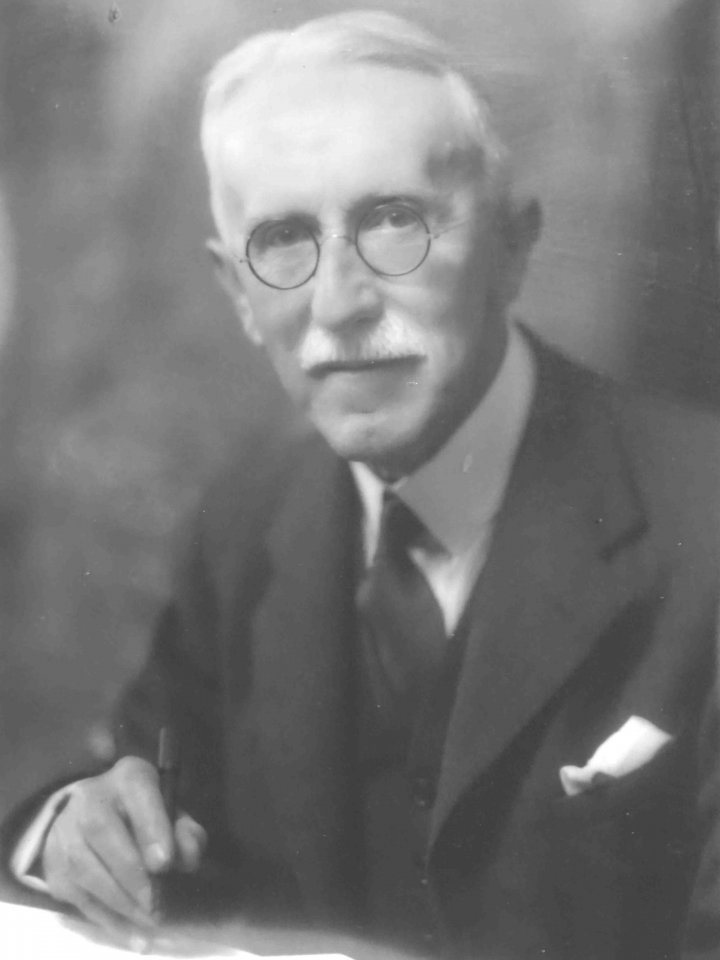
Henry D'Oyley Wolvey ASTLEY (born 1865 & died 1940).
Henry D'Oyley Wolvey Astley Lawyer. Son of H. E. Astley. 1889-1935 Succeeded his father as Town Clerk and like him he was Clerk of the Justices, and Clerk of the Ramsbury Board of Guardians (32 years). Clerk to the Hungerford District and filled nearly all of the principal offices of the town. Outstanding authority on Hungerford matters including guidance to the Hocktide Jury. Regarded as father of the Toc H movement in the town. "He would go out of his way to help anyone ... he was a friend as well as a professional man". Reports of his death and tributes appear in The Newbury Weekly News of 8th and 15th August, 1940. His only son, Capt. E. D. D. Astley (Royal Berkshire Regiment), was killed in action on 1st June, 1918.
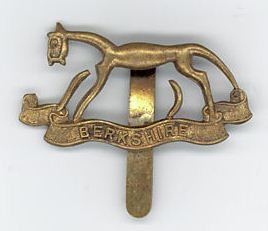
Henry Edward ASTLEY (born 1815 & died 1886).
Henry Edward Astley Solicitor. Son of a clergyman, born at the rectory of Quennington, Gloucestershire. Articled in Bath and moved to London. Returned to Bath and thence to Hungerford in 1843. Appointed Town Clerk and Actuary to the Savings Bank. Seneschal or Steward from 1847 - 1885. 1849 Register of the County Court. 1856 Clerk to the Justices. 1866 Hungerford Board of Guardians. Solicitor and supporter of The Hungerford Gas Company. Local Agent of the Conservative Party. First Clerk of the Hungerford Highway Board. Commissioned in the Royal Berkshire Yeomanry. Mentor of the Hocktide custom. Described as "A sound lawyer and judicious advisor"

The Reverend John ATKINS M.A., LL.B. (born 1843 & died 1924).
The Reverend John Atkins Headmaster of St. Bartholomew Grammar School 1876 - 1902. Born in Swansea 1843. Educated at the University of London and Ordained in 1874. Held various offices until his appointment at Newbury when the school was at The Litten (at the junction of Newtown Road and Pound Street - now apartments). Described by his successor as "a great believer in the cane as an effective instrument of learning".* Also Chaplain to the Newbury Union (The Workhouse) 1878 - 1903. Retired to Whitchurch but continued with occasional duties. He and his wife had six sons and seven daughters. Died 6th January 1924 and buried near his home.
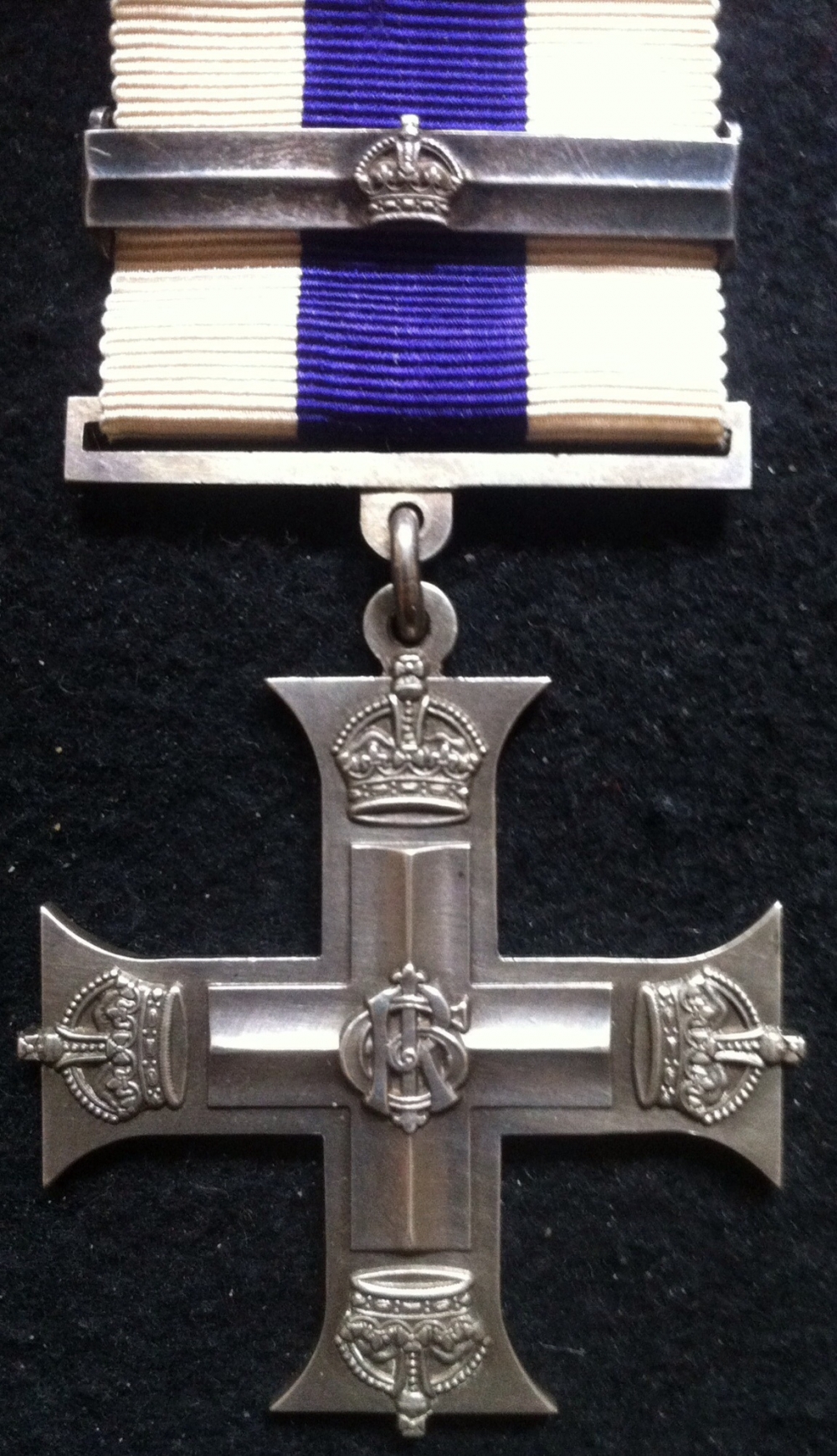
Major Owen Purdue ATTEWELL M.C. & Bar (born 1884 & died 1971).
Owen Purdue Attewell was born at Lambourn 25th January, 1884 where he started his career as an assistant at St. Michael's School. His next appointment was as headmaster at Wickham School. At the outbreak of WW1 he enlisted first as a Special Constable, then in 9th Royal Berkshire Regiment, worked his way up through the ranks, and was later gazetted 2nd lieutenant in the 4th Battalion Royal Fusiliers. Reports of those actions which led to him being twice awarded the Military Cross, conferred on him by King George V, may be found at hungerfordvirtualmuseum.co.uk. He returned to teaching after the war and was the second Headmaster of The All-Age Council School, Hungerford from 1921 to 1925. Whilst there he was also the Captain of the Hungerford Volunteer Fire Brigade, Chairman of the British Legion, Secretary of the Savings Group and President of Newbury and District Teachers' Association. In 1939 he was headmaster of the Elementary School, Little Wymondley (near Hitchen), then during WW2 ran the Grange at Stevenage for 90 unbilletable boys. Moved to Shefford Woodlands on retirement and was secretary of Great Shefford PCC. A keen shooter and cricketer, being a life vice-president of Welford Cricket Club. He died in the Newbury District Hospital on 2 September 1971 and was buried at the Parish Church, Great Shefford. His obituary appeared in the Newbury Weekly News on 9th September, 1971
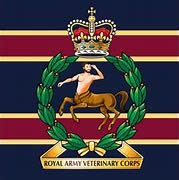
Major William Knight BARRON (born 1876 & died 1957).
Major William Knight Barron was a Member of the Royal College of Veterinary Surgeons. Took over The Cranmore Veterinary Centre Chillder Thornton, Cheshire on the death of his father in 1903 having graduated from Edinburgh. Joined the Army Veterinary Corps (designated as 'Royal' in November 1918) at the outbreak of World War 1 in 1914 and served in France. Awarded the 1914-15 Star, British War Medal and Victory Medal. After the war he choose to practise in Haverfordwest, Pembrokeshire at that time an important centre for heavy horse breeding. Came to Newbury in 1921 as a veterinary surgeon in practice in The Broadway. Was Captain of the Newbury Volunteer Fire Brigade for five years. Moved to Lambourne and then to Guildford. On retirement in 1955 he returned to Newbury to live with his daughter and son-in-law. He died in Newbury Hospital on 13th February, 1957 (His obituary appeared in the Newbury Weekly News on 21st February, 1957).
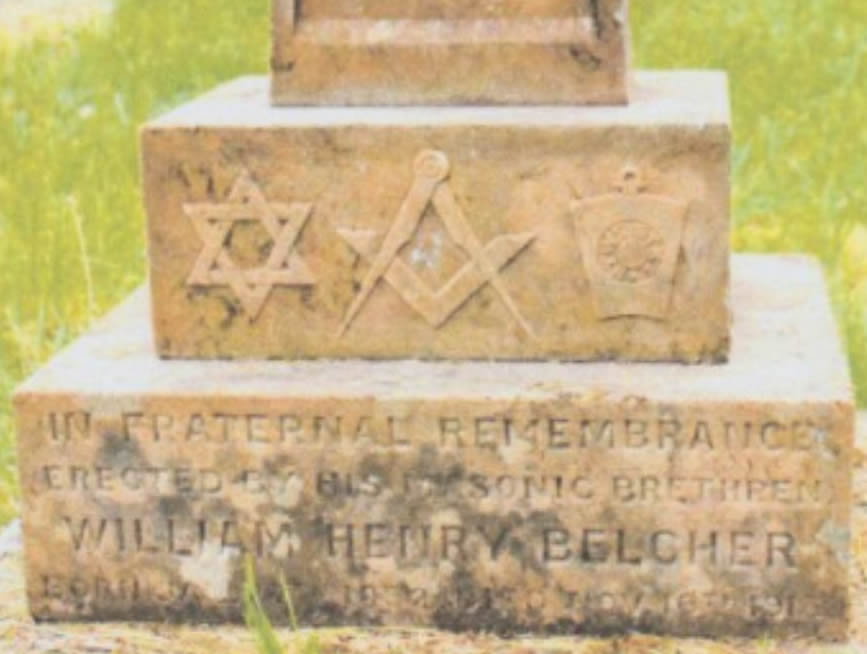
William Henry BELCHER (born 1852 & died 1913).
William Henry Belcher was a Solicitor of Newbury. Born in Faringdon, educated at Magdalen College School, Oxford. Came to Newbury 1877 and took over the practice of W.H. Cave establishing an "intimate connection with Newbury which extended over 36 years". He was "a familiar figure in public and social life, identifying himself with many local institutions, taking his share in much that concerned the general good". Clerk to the Church Estates. Clerk to the Church and Child's Charity Trustees. Solicitor to the Newbury Building Society. Clerk to the Hungerford Bench, etc. Committee member of the Newbury District Field Club. Director of the Literary and Scientific Institution. Keen sportsman - cricket, golf and later bowls. Ardent musician - could sing a good song or tell an amusing story. Lived at Castle House, Old Bath Road, Speen. A son, 2nd Lt. Basil Henry Belcher, was killed in World War 1. Buried in St. Mary's Churchyard, Speen.
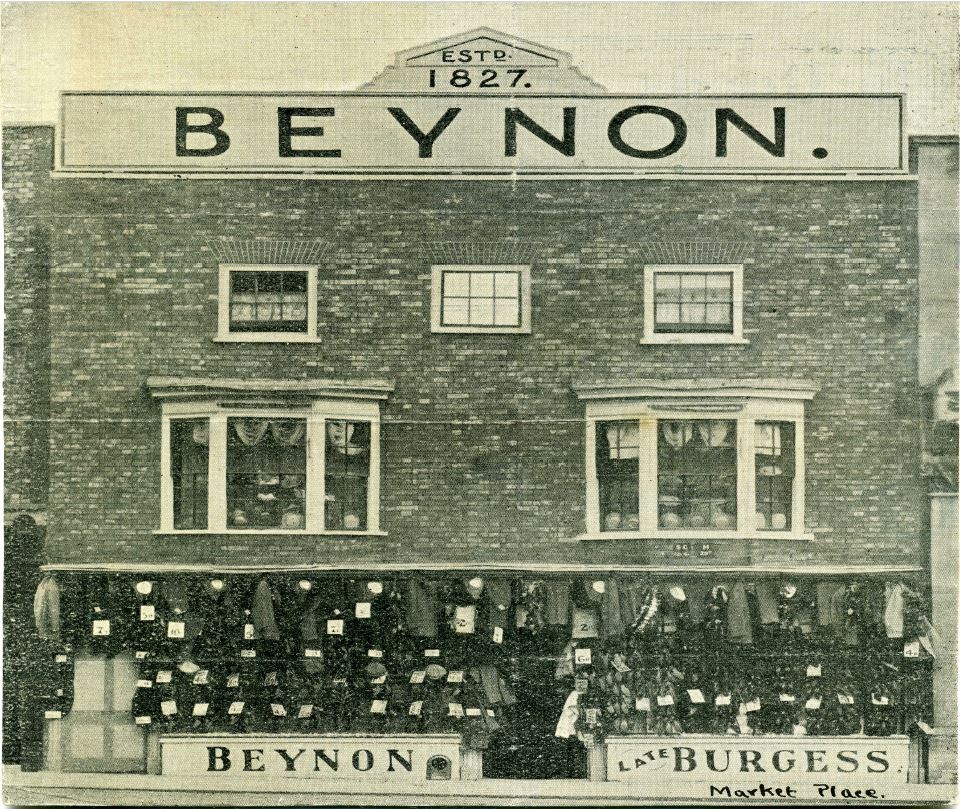
Richard BEYNON (JP.) (born 1849 & died 1934).
Richard Beynon came to Newbury in 1890 from Cheltenham to take over the old-established clothier's and drapery business of Mr. Burgess in the Market Place which had been established in 1827. Said to be "one of the finest and most successful businesses in the town" [The business continued until the 1980s]. 1899 Became a member of the Newbury Board of Guardians and Chairman from 1906 to 1913. Was a member of Newbury Borough Council, and was on the Council's Museum and Free Public Library Committee when the Newbury Museum was opened in 1904. Was a "Justice of the Peace" sitting on the Newbury County Bench. His obituary (Newbury Weekly News 8th Nov. 1934) tells of his heart of gold, and that he "applied himself to his business, to the public life, and to his good deeds for others". His grave at Greenham Churchyard also commemorates his son Thomas Campbell Beynon, an Air Mechanic in the Royal Flying Corps, who died in 1916 during World War 1 aged 34.
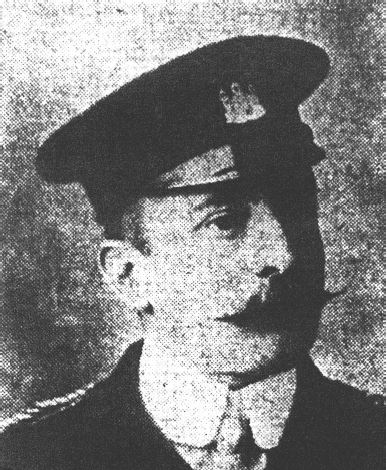
Henry John BOOTH (born 1869 & died 1929)
Henry John Booth was the son of Rev. W.H. Booth. Born in Newbury but as a child went north with his father. Educated at the High School, Newcastle-under-Lyme. Returned to Berkshire and was articled to A.W. Neate in Hungerford. Went into partnership with Albert Church in the Corn and Meal business in the Town Mills and Bartholomew Street. "Always an energetic enthusiastic man" a member of the Berkshire Voluntary Mounted Infantry, the Newbury Church Choir, and the Newbury Volunteer Fire Brigade becoming a Second Officer in which capacity he visited the continent and narrowly escaped at the start of World War 1. Moved to a small holding in Burghclere where he bred dogs. Had charge of the Highclere Castle Fire Brigade. Known as 'The Little General' (because of General Booth of the Salvation Army) and quoted as being "one of the most genuinely liked men ... he was genial, witty and companionable ... he was truly a big-hearted man and loved to assist all good causes in any way ...nothing was too much trouble to him in helping others". He died on 31st August, 1929, aged 60, and was buried in Newtown Road Cemetery. His wife Harriett lived on until 1954, dying at 81.

The Reverend William Henry BOOTH (born 1838 & died 1932).
William Henry Booth was born in Ecchinswell. Started business with his brother as a grocer on the bridge in Newbury, but then went into the Church and was ordained from Lichfield College in 1879 and appointed a curate at Eyam, Derbyshire. Curate-in-charge at Basford, Staffs 1881-82 then appointed Vicar of Gleadless, Sheffield. 1887 became Vicar of Woodhouse, Sheffield for 30 years until his retirement to Newbury where he lived on the Newtown Road. "He was upright, alert and wonderfully active". He died following a stroke on 25th March 1932 aged 94 joining his wife in Newtown Road Cemetery who had pre-deceased him by 62 years. At his death he was described as "the Oldest Freemason in Berkshire" and at the funeral the Masons "performed their customary ritual of dropping sprigs of acacia into the grave".

George BOYER (born 1837 & died 1904).
George Boyer took over the business of plumbing and house decoration from his father in the 1850s. Worked on the restoration of the Parish Church and was employed on the beautification of many of the mansions in the district. One of the early 'Volunteers' serving 19 years whilst taking great interest in the promotion of the movement. Starting as a boy chorister he was a church choir member for 39 years. Afterwards became a sides-man. For half a century he decorated the Town Hall for the Craven Hunt Ball. His grave is in Newtown Road Cemetery (W 154).
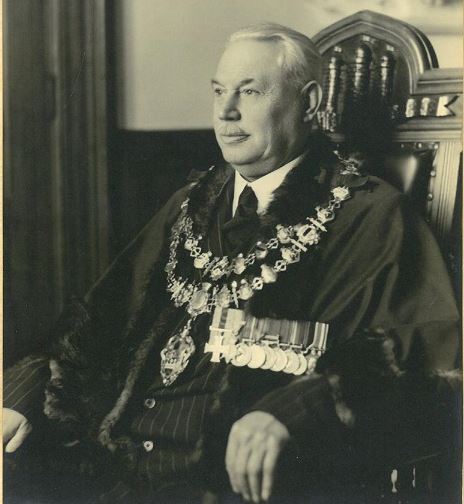
Major Albert Victor BRADSHAW M.C. (born 1888 & died 1957)
Major Albert Victor BRADSHAW M.C., Mayor of Newbury 1946-47. Starting as a guardsman in the Scots Guards, he later transferred to the Argyll & Sutherland Highlanders. He was a member of the original Expeditionary Force in 1914 and distinguished himself in Belgium. Was to become the army's youngest Regimental Sergeant Major (RSM). He was commissioned into the Royal Berkshire Regiment in 1918, winning his MC shortly afterwards in August 1918 through gallantry on the Western Front. ARP Officer in 1939. He also served in the Second World War 1941-43 in the Royal Pioneer Corps. Newbury Borough Councillor 1928-48. As Mayor, he conferred the Freedom of the Borough on the Royal Berkshire Regiment. He was a founder member and office holder of the Newbury Royal British Legion branch.
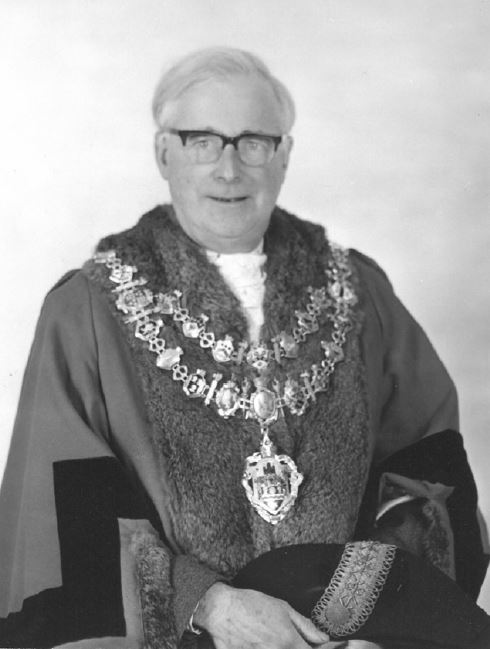
Percy William George BURGESS O.B.E. (born 1913 & died 1991).
Percy William George Burgess O.B.E. was Mayor of Newbury in 1971. He was born in Bath. Was in the R.A.F. 1930-60: had 40-50 postings all over the world. Commissioned 1941. Served as a pilot in World War 2 and the Berlin Airlift and Greek Earthquake. Promoted to Wing Commander 1954. Made an Officer of the Most Excellent Order of the British Empire 1957. 1960-78 Senior Experimental Officer at AWE Aldermaston. Served on and Chaired many Council Committees at various times. Member of Citizens' Advice Bureau Management. Governor of Robert Sandilands School. President of the local branch of the RAF Association. Member of Probus

Alexander BURNS (born 16th October 1838 & died 1891).
Alexander Burns was born in Ashkirk, Roxburgh, Scotland. The 1861 census shows him living in Northumberland and the 1871 census has him in Newbury. He married Charlotte Emma Seward at Kingsclere on 20th April, 1873 and they went on to have six children, some sadly dying in infancy. He opened a Tailors at 12 Bartholomew Street advertising as "Alexander Burns, Tailor, Clothier, Hatter, Hosier and practical Shirt Maker". An obituary recorded "... a prominent tradesman has passed away - after a somewhat lengthened illness ... although not a member of any public body, he took a great interest in local affairs." He died 10th July, 1891 aged 51 leaving £809 12s 8d to his widow. He is buried in Newtown Road Cemetery, Newbury.
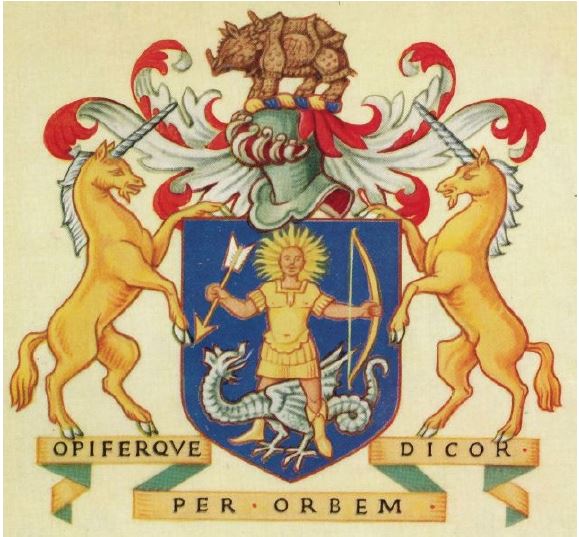
Henry BURSEY (born 1817 & died 1873).
Henry Bursey was born 19th January 1817 at Kennington, Surrey. Member of the Royal College of Surgeons (1839). Licentiate of the Worshipful Society of Apothecaries (1840). Practised in Newbury for 21 years. Married with 13 children, some sadly dying in infancy. Medical Officer of the First District of the Newbury Union and that of the Union Workhouse. Also Medical Officer to several Benefit Societies. Regarded as taking a high rank in his profession. Died 23rd May 1873, buried in Newtown Road Cemetery.
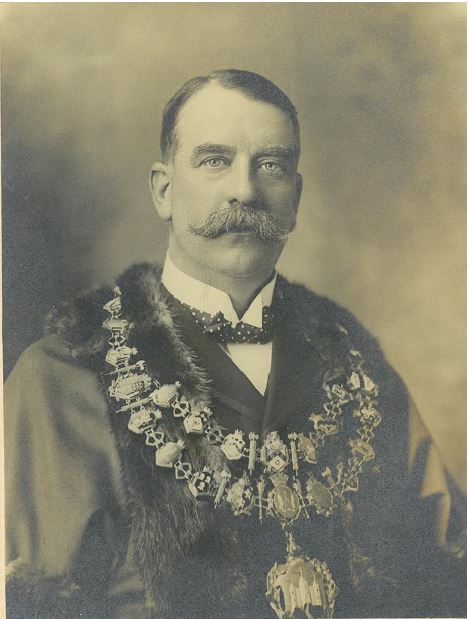
Alfred CAMP (born 1859 & died 1932).
Alfred Camp founder in 1886 of the Camp part of Camp Hopson as a drapery bazaar in Northbrook Street. The merger into Camp Hopson took place in 1921 following the marriage of his daughter Norah with Paul Hopson (1895 - 1980), the son of Joseph Herbert Hopson (1861 - 1930), son of Joseph Hopson, Mayor in 1882. Alfred Camp was the first Chairman. Camp Hopson was acquired by Morleys Stores in 2014. As Mayor, he issued Coronation medals for the Coronation of George V and Queen Mary in June 1911.
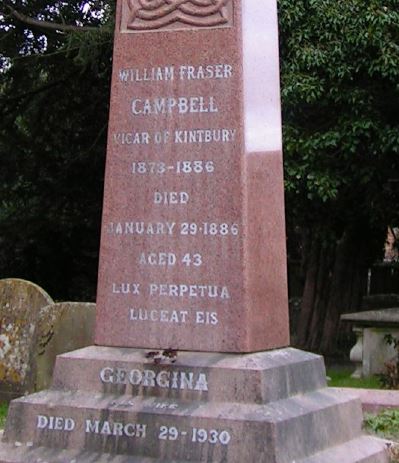
The Reverend William Fraser CAMPBELL M.A., B.C.L. (born 1843 & died 1886).
The Reverend William Fraser Campbell, Vicar of Kintbury, was of Scottish origin - his home was Snettisham Hall, Norfolk. His father was Captain (Army) Campbell, born in the East Indies, 2nd February, 1808. Graduated with an MA at Christ Church, Oxford 1867 and quoted as "proved himself to be a great athlete, winning many prizes". He was licensed to the curacy of Hungerford, subsequently went to Barley, Herts. 1872 appointed vicar of Kintbury. During his vicariate the Parish Church was restored "All auxiliaries of the church found him an energetic friend". "All the organisations the parish could possess he was the prime promoter". He died on a trip to London with his mother on 29th January, 1886 - aged 43. His body was brought back to Kintbury by train and buried in St. Mary's churchyard on 3rd February, 1886.

William Henry CAVE (born 1819 & died 1878).
William Henry Cave was Mayor of Newbury 1866 & 1867. Baptised in Padworth 8th October, 1819. Married 1861 to Elizabeth Martin - had 9 children. Qualified as a solicitor, practising in the Market Place. Anglican: Organist at St. Mary's Thatcham. Treasurer of the English Church Union. Promoted the Thatcham Gas Works and made Alderman 1874. Hon. Secretary of the Literary Institution. 1861 census has him living at London Road, Speen. 1871 shows him and family at 18 Donnington Square. By 1874 he'd moved to No. 26 where he died on 29th September 1878 aged 58. Buried with Masonic Honours at Speen Churchyard.

Benjamin GROBETY (born 1781 & died 1856).
Benjamin Grobety was born in Marlborough, Wiltshire. His obituaries tell us:- "His name will long be held in remembrance, from his connection with 'the road', having been in an extensive way of business as a road-waggon master, from this town to London, nearly half a century. He was highly respected, had been for many years employed in assisting the overseers in making out the rates and collecting same.". Ancestry suggests he was married twice, to Ann Cooper on 14th June, 1814 at St. Andrew, Holborn, and in the January quarter of 1843 at Newbury. The 1841 census has him (spelt "Grobetty") living in Smith's Crescent, Speen aged 65 together with Ann Wise (aged 25): professions unclear. The 1851 census shows him in West Street when he was 70 with wife Ann (36) and three children aged 9, 7 and 6. Died 30th October, 1856 ("aged 84/87"?) and was buried in Newtown Road Cemetery apparently later joined by daughter Alice who died in July 1858 and Ann who died in March, 1864.
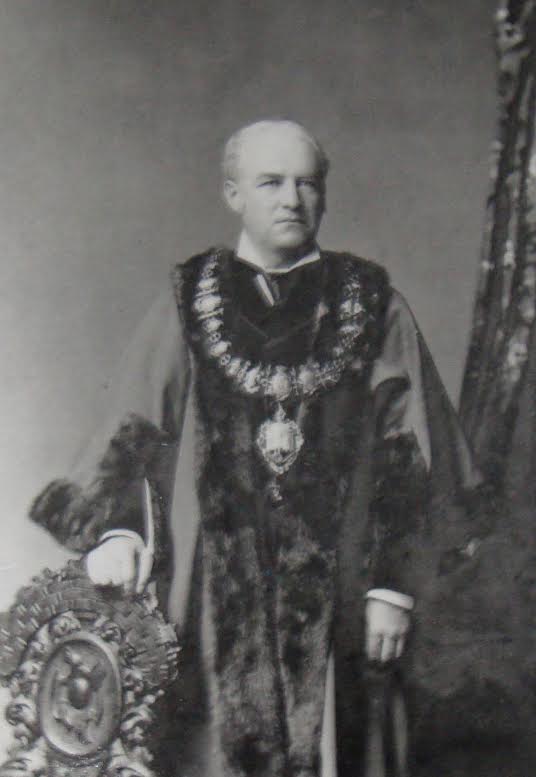
Harman Skinner HANINGTON J.P. (born 1847 & died 1901).
Harman Skinner Hanington, draper and furnishing undertaker at 19 Northbrook Street. Known by his middle name of "Skinner". Nephew of George Higgons, Mayor in 1842, whose business he inherited. A major player in the Newbury Amateur Dramatic Society and Newbury Amateur Minstrels (also known as the Christy Minstrels) and organiser of their events. In the Minstrels he took the part of Mr Tambourine. Elected to the Council 1891. Mayor 1894. Conservative. He celebrated his election as Mayor by driving a steamroller through the town. Anglican. JP 1897.

Edward Pointer HASKINS (born 1791 & died 1841).
Edward Pointer Haskins was born 25th October, 1791 in Newbury - one of eight children. Succeeded to his father's Wines and Spirits Business carried out in the Market Place and later in Northbrook Street. Elected to the Town Council in 1818, becoming Mayor in 1823 and served again for a short period in 1828 when the then Mayor died in office. Edward died on 22nd August, 1841 at Shaw Crescent "most deeply lamented ... in his 51st year, after long and painful illness" and was buried in St. Nicholas' churchyard.
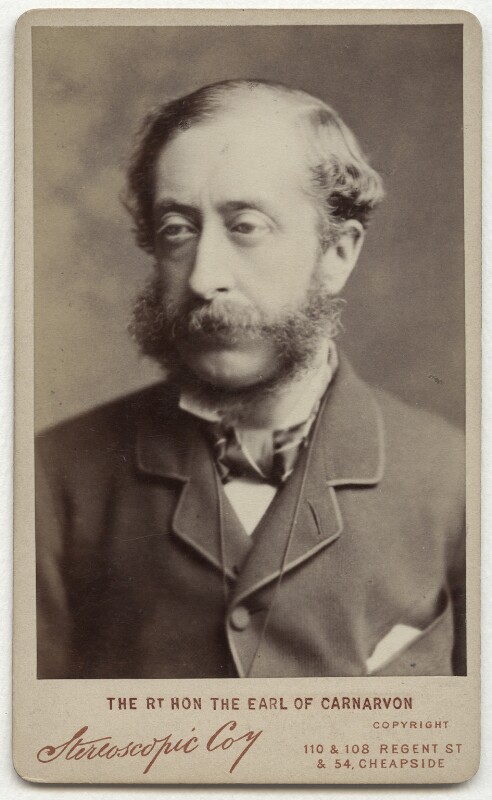
Lord CARNARVON (born 24 June 1831 & died 29 June 1890).
Henry Howard Molyneux Herbert, 4th Earl of Carnarvon PC, DL, FRS, FSA. Educated at Eton and Christ Church, Oxford. A British politician and a leading member of the Conservative Party. Colonial Secretary, 1866-7 & 1874-8. Lord Lieutenant of Ireland, 1885-6. High Steward of Newbury 1884-1890. Lord Lieutenant of Hampshire 1887-90. Father of the 5th Earl, discoverer of the tomb of Tutankhamun.

Frederic Charles HOPSON (born 1863 & died 1934).
Frederic Charles Hopson son of Joseph Hopson, Mayor in 1882. Joint Director with his brother Joseph Herbert Hopson (1861 - 1930) of the Hopson part of Camp Hopson. Chairman of the combined company 1932. Elected to the Council 1899. Promoted the Public Library and enlargement of the Museum. Justice of the Peace 1906. Alderman 1925. Secretary of Newbury Congregational Church.* Mr. Hopson's original shop was at 64 Northbrook Street on the corner of West Street - now (2022) occupied by Metro Bank
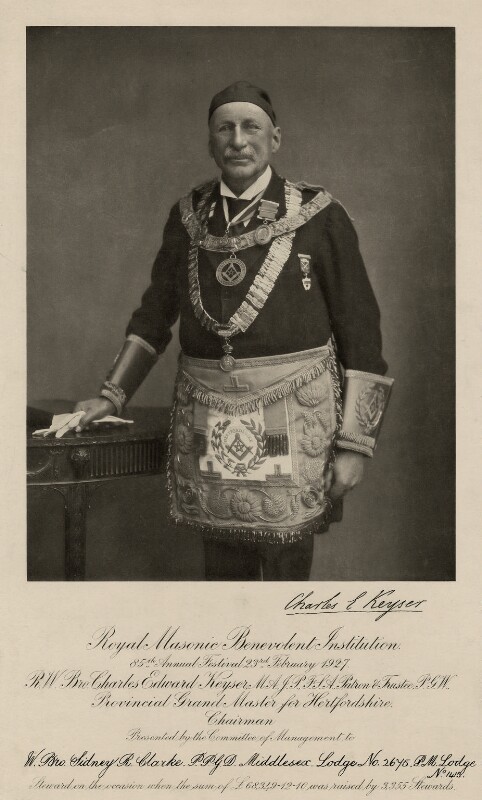
Charles Edward KEYSER (born 1847 & died 1929).
Charles Edward Keyser was educated at Eton & Trinity College, Cambridge. Studied at Inner Temple but became British Stockbroker. Was an authority on church architecture and was President of the British Archaeological Association. Became a J.P. and Councillor in both Hertfordshire and Berkshire. Was Deputy Lieutenant and High Sheriff of Berkshire. Lord of the Manor of Aldermaston. President of Newbury District Field Club and a keen sportsman
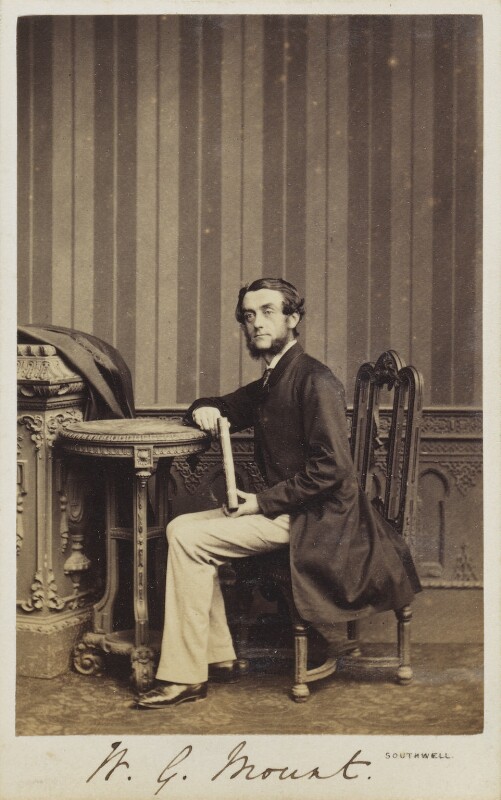
William George MOUNT (born 1824 & died 1906).
William George Mount was born on the 18th July 1824. He was educated at Eton and Balliol College, Oxford where he graduated with an M.A. Called to the Bar in 1849. Became a Magistrate in 1851 and High Sheriff of Berkshire in 1877. First Member of Parliament for Newbury being narrowly elected in 1885. Served as MP for 15 years before standing down in 1900. Chairman of the Quarter Sessions from 1887 to 1902. First Chairman of Berkshire County Council 1889 to 1906. One time President of The Newbury & District Field Club. He is the great great grandfather of David William Donald CAMERON, the former British politician who served as UK Prime Minister. William died on the 14th January 1906, buried in Wasing. (For more info see his obituary in the Newbury Weekly News of 18th January 1906)

John PACKER (born 1784 & died 1855).
John Packer was born 4th July, 1784 at Reading. An advertisement in Berkshire Chronicle of 26th February, 1825 shows him as being a Salt, Coal and Corn Merchant, Newbury. The same paper of 13th January, 1855 reports the death of John Packer Senior on 7th January, 1855. He was buried at Newtown Road Cemetery on 13th . His son, John Junior, took on the business but was not a mason. Another son, Charles, became the Vicar of St. Mark's, Longwood for 38 years. Daughter, Ellen, married James Porteus Jackson, Newbury Mayor 1867.

William Stephenson RAINE M.B.E. (born 1880 & died 1955).
William Stephenson Raine was born at Bernard Castle, Co. Durham. 40 years Surveyor to Hungerford District Council. At the end of WW1 awarded M.B.E. for his work as Honorary food executive officer at Hungerford. Acted in same voluntary capacity in WW2. Drew up rural housing schemes between the wars - a model followed by other districts. Appointed Justice of the Peace 1942 - Chairman of Lambourn bench. Appointed Chairman of the Hungerford Magistrates 1950. Constable of Hungerford 1941 - 1945. Berkshire County Councillor 1949 - 1955. Chairman of Hungerford Council School managers, War Memorial Committee, Air Training Corps and Hungerford Waterworks Undertaking. Keen golfer, bowler and bridge player. Credited with "50 years of Public Service".
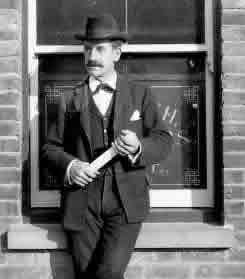
Ernest Albert STICKLAND (born 1871 & died 1947).
Ernest Albert Stickland Associate Member of the Royal Institution of Chartered Surveyors. Past President of the Institution of Civil Engineers, Director of the Royal Benefit Building Society. A native of Budleigh Salterton but educated at the Public Grammar School, Newcastle-upon-Tyne. Apparently known throughout his life as 'Sticky'. After service in the Newcastle City Engineer's office moved to Stockport then later was engaged on surveying for the London, Manchester, Sheffield and Lincolnshire Railways before carrying out work on a drainage scheme in Blackburn. Further experience was gained in York and Reading until he became Surveyor of Newbury in 1889. Transferred to Windsor in 1897 where, as Borough Engineer, he was closely involved with redevelopment and many other projects throughout the town during an extended career of 33 years until 1930. On his retirement he was presented with an illuminated address and a cheque.* Died 1st January, 1947 aged 85; the funeral service being held in the Chapel of Windsor Cemetery. His obituary has him as "a man of great energy and alertness of mind, enjoying exceptional health".
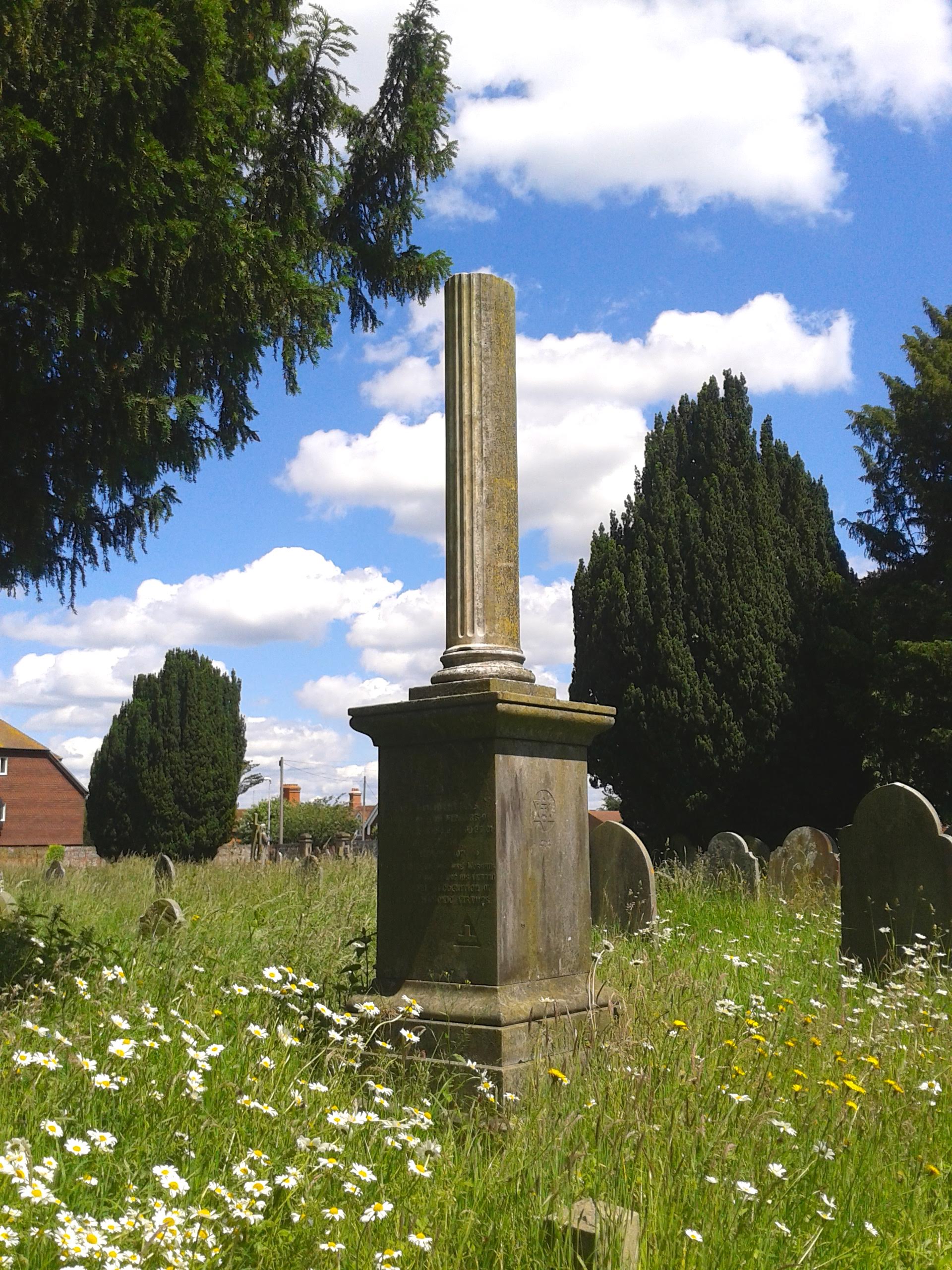
Walter Berkeley WILSON (born 1850 & died 1882).
Walter Berkeley Wilson the son of butcher, ex-Mayor and Alderman Edward Wilson, was a popular and fit 32 year-old who enjoyed horse riding, playing tennis, etc., and was a volunteer fireman. After an uneventful evening he went to bed on Friday and simply failed to wake on the Saturday morning. Nothing untoward was found during his postmortem and at the Coroner's Inquest held that evening in the Jack Hotel (now the site of M&S), the Jury returned a verdict of ... "Died from the visitation of God"! At the time of his death, Walter was the Worshipful Master (Chairman) of the local freemasons' lodge, Loyal Berkshire Lodge of Hope, and its members clubbed together to provide this fine memorial (bearing many masonic emblems) which can be seen from the front of the chapel. A "broken column" universally commemorates a life cut short in its prime. The family butcher's shop was at 85 Northbrook Street; premises now (2022) occupied by a Vodafone showroom.